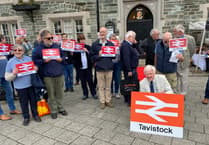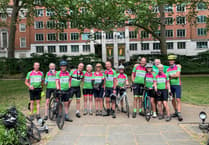Following the recent local government elections, West Devon Borough Council has a new leader — Neil Jory tells Sarah Pitt why he is looking forward to the challenge.
Neil Jory says he didn’t know quite what to expect when he put himself forward as a West Devon borough councillor four years ago.
But he found he enjoyed it, warts and all.
Having been re-elected in his home ward of Milton Ford, he has now found himself leader of the council. It is a position he will hold for four years, replacing long-time leader Philip Sanders who lost his seat in the election on May 2.
He says being made leader by his fellow councillors had come as a surprise (he’s also leader of the Conservative group, which have a majority of one on the 31-seat council) and he does not know quite what to expect.
But as we talk, it becomes clear that Neil, 59, has quite a few ideas for a way forward for the cash-strapped council, which was recently at the centre of fierce controversy over plans to build a budget hotel on a public car park in the centre of Tavistock.
Neil, a former banker, had been involved in the council’s budget reduction process including the ‘invest to earn’ group which proposed the controversial hotel idea as part of efforts to find make money to compensate for the phasing out of its £3-million annual grant from central government.
‘The invest to earn group has in many ways done a fantastic job,’ he said. ‘We have got income coming in from a variety of investments that we wouldn’t have squared the budget without and which will stand the borough in good stead in the years ahead.’
He says, though, that the council had learned its lesson and would communicate better with both the public and town and parish councils over any money-making schemes in future.
‘With the hotel, it was a case of a perfect storm.’
One of his first actions as leader has been to propose an invest to earn council committee, which would be answerable to councillors, to avoid any more ‘behind closed doors’ deals.
‘I think transparency is critical in all these things,’ he said. ‘I think over the last four years, for very good reasons, mainly the financial situation, we have been looking internally at how we manage things, at the structure of the staff, where we have saved £2.2-million in salaries, at trying to fix the budget problems that have been thrown at us.
‘We have spent a lot of time gazing at our own navels. I think relationships outside the council have suffered a bit as a result, so our priority now is for members of the council to go out and engage with their communities.’
He said one of his first tasks would be to go along, with deputy leader Lois Samuel, to talk to town councils, with whom relationships have suffered over the borough council shutting public toilets to save money from the budget.
‘We have had a really bad relationship with the town councils and I think we have got to break that,’ he said.
‘We need to get that dialogue going with town and parish councils and get feedback from them and residents as to what we should be doing.
‘We can’t fix everything – I’m not chancellor of the exchequer – we have got a fairly small budget, but we will do what we can.
‘The climate change thing is really important and I think maybe by bringing together different groups within the borough to work collectively we can have a bigger impact than we otherwise would.’
He suggested that the new invest to earn committee could look at borrowing public money to invest in renewable energy schemes.
‘If we can find a way of investing some money that would give us a return but also focus on green energy production, I would love to do that,’ he said. ‘And in doing that we could potentially solve things like fuel poverty, or how people heat their homes, in the borough.’
He suggested charging points for electric cars could be put in council car parks and said residents would be encouraged to recycle more.
‘We are doing really well but we know we could do better, for example we do checks from time to time on the black bin bag rubbish and there is still a lot that could be recycled that goes in the bags, so we will be doing a campaign to encourage people to do that. We find that whenever we do a publicity campaign the amount of recycling goes up.’
‘We live in a beautiful area and the landscape and natural environment as well as our historical built environment are the assets we have got to look after.’
Neil particularly appreciates the beauty of the landscape of West Devon as a relative newcomer.
He and his wife Caryn, a nurse in the NHS, and three children, now in their 20s, moved to their cottage in Chillaton in 2002 when Neil got a job as bursar at Mount House School, now part of Kelly College.
For Neil, who hails originally from south west London, it was a bit of a dream come true.
‘I have always liked this part of the world,’ he said. ‘My father is Cornish and was brought up in west Cornwall so as kids we always came down to Cornwall for the summer holidays and would spend our time visiting elderly relatives and seeing lots of Cornwall, which I used to really enjoy.
‘Also, we used to come down to this part of the world when I was at school with the school cadet force to do adventure training on Dartmoor. It was something of a highlight of the year. So to get the opportunity to move down here in 2002 was something I jumped at.’
Neil went to work for Barclays Bank on leaving school studying for professional qualifications alongside work.
‘I worked for the bank’s property services in the city and that was really interesting because we were looking at really big projects at that time and working out the finance of them, including the bank’s headquarters in Lombard Street and new premises in New York.
‘I never got to go there, but I was involved in the figures,’ he said.
‘I got really interested in the training when I was working in the bank and that led me into educational administration. I did the finance and administration for several sixth form colleges.’
This led to a move from London to Eastbourne in East Sussex to take up a post as an assistant bursar there.
It was from there that he and his family moved to Tavistock.
Neil, who has also run his own business, now works three days a week for Business Info Point, a not-for-profit enterprise based in Okehampton, which helps business start ups across the South West.
He is hoping that all this experience will stand him in good stead as leader of the council, where work on balancing the books is ongoing.
‘The budget potentially is still a problem, we can’t afford to take our eye off the ball,’ he said.
‘We will be starting on our 2020/21 soon and we are looking potentially at a half million shortfall for the year.’
He said, though, that after a tumultuous phase for the council it was sailing into smoother waters.
‘I’m really looking forward to it,’ he added.
‘We have got 31 people on the council who are a really good bunch of people and they have become councillors because they feel they can help their community.
‘There is a lot of positivity at the moment and people are excited about this climate change initiative.
‘What we have got to do is bring some things forward and make them happen.’




-as-Granito-Lounge-on-Duke-Street-Tavistock.jpeg?width=209&height=140&crop=209:145,smart&quality=75)
Comments
This article has no comments yet. Be the first to leave a comment.